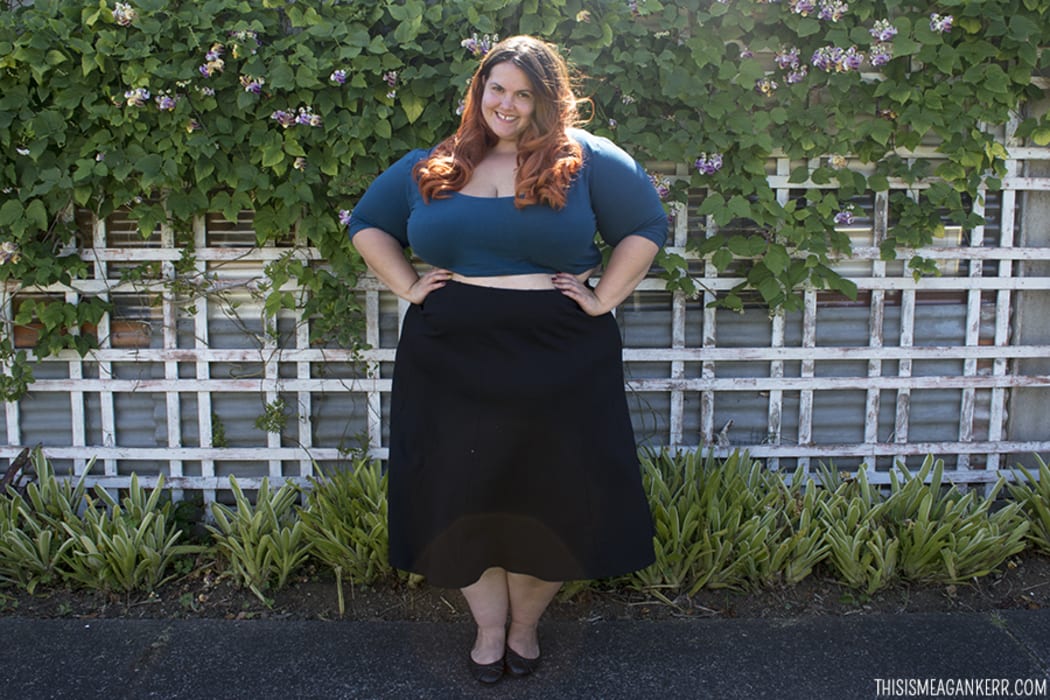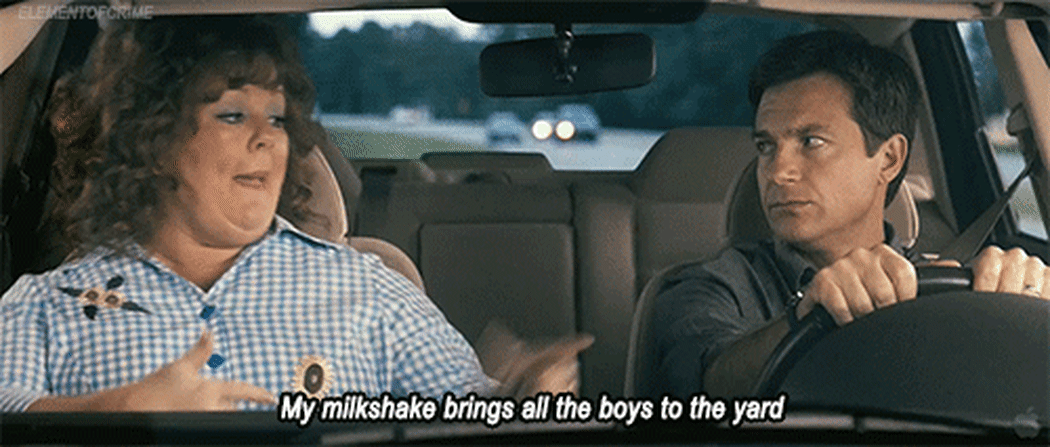There are a lot of terms people use when they’re trying to be nice about your size. I get big-boned a lot, like I’m some sort of dinosaur-woman or neanderthal. Voluptuous and curvy are used quite a lot too, but they’re often confused with size 10 girls with big boobs and big butts.
“Curves in all the right places” they say, as opposed to having curves in every place possible. I don’t mind the term plus-size, but then if we go by modelling terms, plus size is usually a 12. I think the last time I was a size 12 was when I was 12.
I’m a 22-year-old, fashion-loving female who likes earl grey tea, going to the beach, and trashy reality television. I’m also overweight, big-boned or whatever else you want to call it.
So is Meagan Kerr.
Meagan is a well-known plus size fashion blogger based in Auckland. Her popular website encourages and promotes “fabulous fat fashion, self-love and body positivity”. She discusses both fun and more serious topics; outfit posts, beauty reviews and tutorials, to body image, health and fitness.

"The thing that made me stand out from all of the other fashion bloggers in New Zealand was that I’m fat. So I thought I’d write about that." - Meagan Kerr Photo: Supplied
Already a writer for NZ Girl, Meagan started a beauty and fashion blog but soon came to realise that her point of difference was her size. “We had a speaker talk to us about how it was really important to find that focus and speak about the thing that you’re the expert at, and the thing that made me stand out from all of the other fashion bloggers in New Zealand was that I’m fat. So I thought I’d write about that.”
Although she is a role model for body positivity, Meagan admits she was still nervous putting her first post up, but did it anyway. “I thought I would put myself out there and hopefully people would follow.”
For plus-size women, fashion is not always accessible and rarely affordable. There aren’t a lot of size 16+ body types shown in magazines or made into mannequins, and even shopping with friends can be a challenge.
My friends can go shopping for hours on end whereas I just get too hot and bothered in some of the tiny changing rooms.
Standing in the accessories section, pretending you’re really into that weird hat, or you might buy that scarf (in the middle of summer) because you can’t fit any of the clothes in Glassons. Sometimes I can’t even buy jewellery because of my sausage fingers. My friends can go shopping for hours on end whereas I just get too hot and bothered in some of the tiny changing rooms.
As well as a list of the go-to places for awesome “fatshion”, Meagan is also the creator of a body positivity fashion project called Fat Girls Shouldn’t Wear Stripes. In her final year of a degree in design and visual arts, she posted a picture of herself wearing a striped dress on her Facebook page. A man she didn’t know and who had never posted on her page before, commented “fat girls shouldn’t wear stripes”.
She has made it her mission to travel around New Zealand taking photos of plus-size girls wearing the things they were told they shouldn’t wear – figure hugging, skin exposing clothes that celebrate their figures.
“I decided that I wanted to create a body of work that encouraged and inspired other women to love their bodies. I wanted to challenge the ‘fashion rules’ that society seems to dictate.”
Meagan has shot her fashion project in Auckland, Wellington, and Hamilton, and will be in Rotorua next week. She also hopes to be able to travel to more parts of New Zealand and expand nationwide. She’s also planning to be in Gisborne set in May.
Fat Girls Shouldn’t Wear Stripes isn’t just about the photos of fabulous fat females. It’s part of something much bigger. There’s a trend recently where plus-size girls are re-claiming the word “fat” and using it to describe their bodies in a matter-of-fact way. Reclaiming this term is part of the ‘Fat Acceptance Movement’, where the general message is that it’s okay to be fat, and society should not discriminate because of it.
- READ: Ally Garrett on Baring her Bikini Body
Meagan Kerr is openly comfortable with the term “fat” and regularly uses it to describe her own body. “When I was growing up you would never hear it in a positive way ever. It was always said in a nasty comment or under-the-breath, or as a judgement. It’s a descriptive word, I have red hair, I have brown eyes, I’m fat.” She sees “fat” as just a word and believes that any word can be nasty depending on the way it is said.
But for me, “fat” still hurts. It’s not that I don’t want to be strong and say “yes world, I am fat, I am proud and I don’t care what anyone thinks” but it’s not that simple, and there are a lot of people ready and waiting to bring you down if you do.
When dealing with negative comments Meagan says: “There’s a way of having negative feedback but doing that in a positive way. But for people who are just there to be mean, I don’t have time for that.”
Ridiculing plus-size people has become common enough that there is a term for it: fat-shaming. Opposition to the Fat Acceptance Movement led to the creation of #fatshamingweek, courtesy of “masculinist” blogger Roosh Valizadeh. Valizadeh says it is our “responsibility as citizens and lovers of beauty to shame any attempts at fat apologia,” as it puts extra pressure on the healthcare system and encourages accepting something which he believes is a global health concern.
On one hand, I can understand where parts of the argument have come from – obesity is a health issue and can lead to bigger health risks. But, Valizadeh implies that you are unhealthy and cannot be beautiful if you are fat.
I know thin people who are extremely unhealthy, I know thin people who are extremely healthy. I know fat people who are extremely healthy…you can’t judge somebody’s health without knowing anything about them.
I don’t see how these fat-shamers could believe that cruelly making fun of someone’s size would shame them skinny. In fact, a 2014 study looking at the relationship between discrimination and weight argues that “weight discrimination does not encourage weight loss,” and suggests that it might even make it worse.
I’m also not entirely sure how seriously we should take someone who thinks that a “woman’s value significantly depends on her fertility and beauty”. Or who thinks that legalising rape might somehow stop it.
Meagan is all too aware of fat shaming and how it affects the plus size community, “What a sad, unhappy human being they must be. For someone to dedicate that much time to basically giving other people crap for how they are.”
She recently spoke out about Club Physical employing body-shaming advertisements in an attempt to get customers to join their gyms. “I just think it’s unacceptable and it gets me really mad”.
To me, fat-shaming is bullying. Plain and simple. But at the same time, I don’t completely agree with the ‘Fat Acceptance’ movement either. Fat acceptance is the idea that people shouldn’t discriminate on the grounds of someone’s size or weight. But it seems to have started to blur into Fat Activism or Fat Appreciation which suggests that being overweight is healthy and can be seen to be encouraging obesity. And so many of the “fatshion” bloggers fit a certain stereotype – white, able to afford clothes (or get the few retailers there are to sponsor them), and able-bodied.
The bigger issue is that other people’s health is essentially nobody else’s business but their own. Meagan adds, “When you see a photo of a celebrity drinking, do you write letters to that celebrity talking about their health? No, you don’t…I know thin people who are extremely unhealthy, I know thin people who are extremely healthy. I know fat people who are extremely healthy…you can’t judge somebody’s health without knowing anything about them.”
When it comes to negative responses about your size, it’s not always as easy as Meagan can make it seem, and she admits that she didn’t start out completely confident.
“Start by loving one part of yourself. It might be as small as your hands for example, and then show that part of you - love. Use nice lotions on your hands, paint your nails…appreciate all the great things they do for you. And then move on to another body part the next week.”
She suggests that by gradually learning to appreciate each and every part of your body, you will be able to get a point where you can’t think of something you don’t like.
Having Kiwi plus-size role models like Meagan Kerr is important, and means that we don’t have to feel alone on those low days. It’s also great to see that there are plus-size women in the media, like Melissa McCarthy, who do not allow their size to define their character.

"Melissa McCarthy proves that she is more than her size, and has defined herself through her humour instead." Photo: Unknown
McCarthy is known for being a plus-size actress, but she rarely addresses it publically – and why should she? Often it is easier to self-deprecate when in the spotlight, but by not addressing her weight, McCarthy proves that she is more than her size, and has defined herself through her humour instead.
So maybe I’m not ready to take on the “fat” label just yet, but that’s okay. We’re all at different stages and it’s not a competition. There is no wrong way to be who you are, and there is certainly nothing wrong or shameful about loving yourself.
I’m a 22-year-old, fashion-loving female who likes earl grey tea, going to the beach, and trashy reality television. I’m also a dinosaur-woman, and that’s fine by me.

